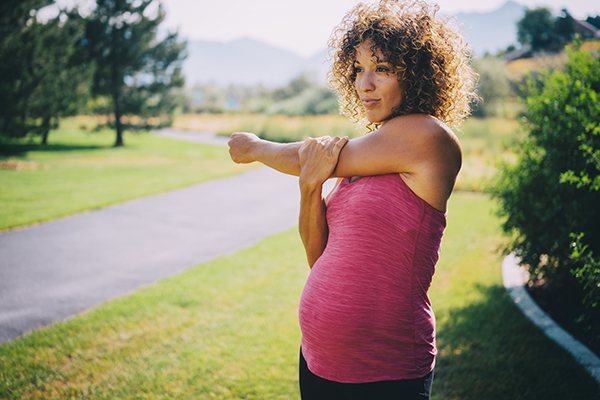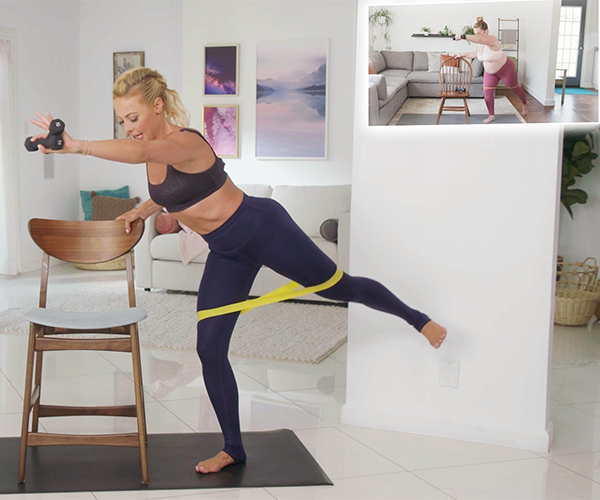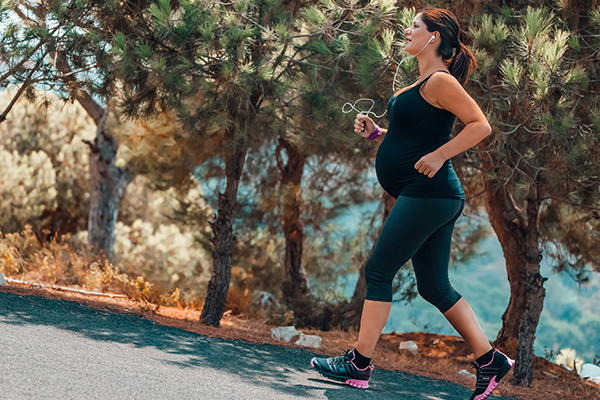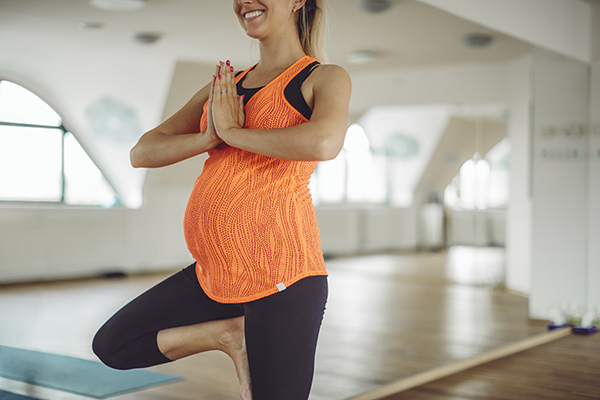Best Pregnancy Workouts to Try

Whether you’re looking to maintain your fitness routine throughout your pregnancy or kickstart a healthier lifestyle now that you’re a mama-to-be, you may be wondering about pregnancy workouts.
Is it safe to exercise while pregnant, or will you have to hit pause on your workouts for the next nine months?
As long as your obstetrician gives you the green light, it’s generally safe to work out at the same (but not greater) intensity while pregnant as you did before you became pregnant.
“Most women can either continue their current exercise routine or slowly begin one as soon as they find out they are pregnant or feel ready,” says Brooke Cavalla, BSKin, a certified pre- and postnatal exercise specialist and creator of Struggles of a Fit Mom.
“Most exercises are safe during pregnancy except for exercises that can cause you to fall, contact sports, scuba diving, and skydiving,” Cavalla says.
Other exercises to avoid after your first trimester are the exercises that have you laying on your back for extended periods (e.g., crunch or sit-up) or those that put you in a plank or push-up position (i.e., with your baby bump between you and the floor).
In fact, pregnancy workouts can benefit you and your baby-to-be. Here’s what you need to know about pregnancy fitness.

Cardio During Pregnancy
According to the American College of Obstetrics and Gynecology (ACOG), healthy moms-to-be should strive for at least 30 minutes of aerobic exercise a day.
But that doesn’t mean you need to cap your pregnancy workouts at 30 minutes!
If you feel up to it — and your doctor approves — you can strive to get at least 150 minutes of moderate-intensity aerobic exercise a week, a guideline set by the U.S. Department of Health and Human Services.
Here are a few great options for cardio during pregnancy.
1. Walking
Walking is hands-down the easiest cardio workout for pregnancy. All you need is a good pair of shoes and a handful of safe walking routes.
Need some motivation to lace up your sneakers? Enlist your dog or borrow a pal’s pooch.
A University of Liverpool study found that dog owners were 50 percent more likely to get at least three hours of activity a week.
2. Swimming
While some cardio workouts might be more challenging during pregnancy because of the added weight, aquatic workouts like swimming often have the opposite effect.
Indeed, many women find them a relief thanks to the buoyancy provided by the water.
Even better: Studies show that swimming can benefit flexibility and cardiovascular endurance, which will benefit you during pregnancy and life as a new mom.
3. Group Fitness Classes
Some low-impact fitness classes can be a fun and low-stress way of getting your heart rate up.
BODi offers a variety of prenatal and postnatal workouts designed to help you stay active during every stage of pregnancy.
Depending on your fitness level, you may want to steer clear of high-impact exercises that involve a lot of jumping and sudden shifting.
“These movements can strain your joints, which already loosen significantly during pregnancy, as well as place extra stress on your abdominal area,” says Sergio Pedemonte, a Toronto-based personal trainer and owner of Your House Fitness.
4. Barre

Barre workouts are comprised of simple, low-impact moves that incorporate elements of Pilates, yoga, and ballet.
These total-body workouts not only raise your heart rate, but also work to strengthen your arms, core, hips, legs, and back — all areas that need to adapt to changes during pregnancy.
As with any exercise, however, it’s important to modify moves as needed throughout the trimesters.
You can challenge yourself but avoid excessive strain and stress.
The Pre & Post Natal Barre Blend program from BODi Super Trainer Elise Joan provide the ideal balance to help moms-to-be stay fit and healthy.
5. Running

If running is already a part of your fitness routine, you may be able to continue doing it during your pregnancy.
“For some women, exercises like jogging may still come easy to you if you were in optimal shape beforehand,” says Jake Dickson, NASM-CPT, USA Weightlifting Advanced Sport Performance Coach, and editor at BarBend. “But you may need to make changes to work around your growing belly.”
If running becomes uncomfortable at any point, adjust your pace or switch to a low-impact cardio workout like walking or swimming.
6. Elliptical
Using an elliptical machine is a great option for low-impact cardio.
If running feels uncomfortable, the elliptical can be a kinder, gentler alternative — you can crank up the speed while minimizing the impact on your joints.
7. Indoor Cycling
There are many benefits of cycling — it’s easier on the joints than running, helps to improve balance, and supports cardiovascular health.
And you can safely reap these benefits throughout your pregnancy with indoor cycling workouts.
According to ACOG: “Because your growing belly can affect your balance and make you more prone to falls, riding a standard bicycle during pregnancy can be risky. Cycling on a stationary bike is a better choice.”
8. Hiking
Hitting the hiking trail is a fun way to get your cardio minutes in, and spending time outdoors can offer stress relief and a mood boost.
Be sure to carry plenty of water to help you stay hydrated, and choose your trails wisely to minimize your risk of falling.
Can I Do Yoga While I’m Pregnant?

Participating in prenatal yoga classes is a holistic, full-body way of conditioning your body to better handle the challenges of pregnancy and the rigors of childbirth.
The postures (known as asanas) help to strengthen your entire body — especially your lower body and pelvic floor — for labor.
Not only that, but it helps improve breath awareness and mindfulness, two vital skills that can reduce stress and anxiety before, during, and after delivery.
You can participate in prenatal yoga classes starting in the first trimester, but “during the second trimester and third trimester as the body starts changing more rapidly, certain movements need to be modified,” Cavalla says.
That includes anything that involves lying on your back for an extended period or exercises that increase intra-abdominal pressure.
The former can increase your risk of abdominal separation (i.e., diastasis recti), and the latter can put pressure on your vena cava artery, causing dizziness and lightheadedness, and compromising the blood (and oxygen) supply to your developing fetus.
You can avoid these pitfalls by following yoga classes specifically designed for each stage of pregnancy.

If you went into pregnancy with a solid baseline of fitness, you may be wondering if more advanced cardio and strength workouts are still safe while you’re expecting.
“It’s really important to listen to your body,” says Sharon Gam, Ph.D., C.S.C.S., a personal trainer and health coach. “If you feel a lot of pressure or discomfort during an exercise, you should back off the weights or speed, or try a different exercise.”
How can you tell if a cardio workout is too strenuous?
Erica Ziel, CPT, certified Pilates instructor and creator of Knocked-Up Fitness, suggests using the “talk test”: If you can carry on a conversation without too much difficulty, you’re good; if speaking in complete sentences is difficult, you’re going to hard.
Pause your workout if you feel pelvic pressure, experience pain, or if your workouts leave you feeling exhausted rather than energized, Ziel adds.
Here are a few specific workouts you may be wondering about — and what you need to know before deciding if they’re right for your pregnancy fitness routine.
Weightlifting
The key to strength training safely while pregnant is to purge your routine of exercises that could potentially cause an impact or fall injury to your or your baby (e.g., bench press, squat, and anything else that puts you between a barbell and the floor).
In practice, that means focusing largely on dumbbell exercises.
By no means should you feel intimidated by weight training, though.
Indeed, lifting weight while pregnant can help you experience “less weight gain, more energy, and an easier birthing experience and recovery,” says Tami Smith, ACE-CPT at Fit Healthy Momma.
Strength training can also benefit mental wellness.
“Your body and life are changing, and that can be scary,” Gam says. “Strength training builds not just physical strength but also mental strength, so you can feel confident that you can handle the challenges that are coming your way!”
It’s ideal to keep the weight light and opt for anywhere from 12 to 15 reps per set.
High-Intensity Interval Training (HIIT)
“There are benefits to safely performing HIIT which include keeping your heart healthy, increasing cardiovascular strength, and maintaining healthy body weight,” Smith says.
However, HIIT during pregnancy isn’t for everyone, and as with every other exercise you consider performing while pregnant, it’s critical that you consult your doctor and get his or her sign-off first.
If you weren’t doing it before you became pregnant, don’t do it afterward.
Also, because joint mobility increases during pregnancy, high-impact moves can potentially increase your risk of injury if you aren’t careful.
If you do perform HIIT, modify exercises if needed, and stop performing any that cause discomfort.
“You should be paying close attention to how your body is feeling and how it’s recovering,” Smith says.
Benefits of Pregnancy Workouts
According to ACOG, exercise during pregnancy can benefit you and your baby.
Here are a few of the potential benefits:
According to a 2019 study published in the journal Medicine & Science in Sports & Exercise, aerobic exercise during pregnancy can also have a positive impact on your baby’s development.
Of course, staying safe and healthy should be your priority, so be sure to get your doctor’s permission before starting any prenatal fitness program.
Stay hydrated before, during, and after your workout.
And contact your doctor immediately if you experience bleeding, abdominal pain, calf pain or swelling, or fluid leakage during or after a workout.